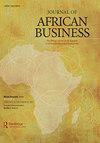女性微观创业与社会包容:个体感知因素的调节作用
IF 1.8
Q3 BUSINESS
引用次数: 3
摘要
摘要:微观创业文献强调了个体感知因素在构建女性社会包容中的作用,同时考虑了形成这种包容的社会制度。然而,由于女性的社会制度,解开个体感知因素与创业结果的关系仍然是一个挑战。基于在麦地那、努瓜和特马运营的459名女性微型企业家的回答,本文以创业自我效能感、对失败的恐惧和韧性为调节因素,考察了女性微型企业家对社会包容的影响。这项研究的价值在于提供了关于微观创业的重要见解,通过更好地加强基于对失败的恐惧和韧性的关系,提高了女性融入社会的可能性。该研究提供了一些有用的学术见解,并为改进旨在将妇女微型创业作为社会包容战略的政策提供了一些实际建议。本文章由计算机程序翻译,如有差异,请以英文原文为准。
Women Micro-entrepreneurship and Social Inclusion: The Moderating Role of Individual Perceptual Factors
ABSTRACT Micro-entrepreneurship literature underscores the role of individual perceptual factors in structuring the social inclusion of women while considering the social systems which shape it. However, untangling the way individual perceptual factors relate to the entrepreneurial outcome, remains a challenge, due to the social systems of women. Based on responses of 459 women micro-entrepreneurs operating in Madina, Nungua, and Tema, this paper examines the influence of women micro-entrepreneurship on social inclusion with entrepreneurial self-efficacy, fear of failure and resilience as moderators. The value of this study lies in providing significant insights on micro-entrepreneurship increasing the probability of women’s social inclusion with a better strengthening of the relationship based on fear of failure and resilience. The study provides some useful academic insights and offers some practical suggestions for improving policy aimed at using women micro-entrepreneurship as a strategy for social inclusion.
求助全文
通过发布文献求助,成功后即可免费获取论文全文。
去求助
来源期刊

Journal of African Business
BUSINESS-
CiteScore
4.60
自引率
10.50%
发文量
36
期刊介绍:
Journal of African Business is the official journal of the Academy of African Business and Development, the largest network of professionals committed to advancement of business development in African nations. JAB strives to comprehensively cover all business disciplines by publishing high quality analytical, conceptual, and empirical articles that demonstrate a substantial contribution to the broad domain of African business. Regardless of the research context, tradition, approach, or philosophy, manuscripts submitted to JAB must demonstrate that the topics investigated are important to the understanding of business practices and the advancement of business knowledge in or with Africa. Particularly, JAB welcomes qualitative and quantitative research papers. JAB is not, however, limited to African-based empirical studies. It searches for various contributions, including those based on countries outside Africa that address issues relevant to African business. Targeted toward academics, policymakers, consultants, and executives, JAB features the latest theoretical developments and cutting-edge research that challenge established beliefs and paradigms and offer alternative ways to cope with the endless change in the business world. Covered areas: Accounting; Agribusiness Management and Policy; Business Law; Economics and Development Policy; Entrepreneurship and Family Business; Finance; Global Business; Human Resource Management; Information and Communications Technology (ICT); Labor Relations; Marketing; Management Information Systems (MIS); Non-Profit Management; Operations and Supply Chain Management; Organizational Behavior and Theory; Organizational Development; Service Management; Small Business Management; Social Responsibility and Ethics; Strategic Management Policy; Technology and Innovation Management; Tourism and Hospitality Management; Transportation and Logistics
 求助内容:
求助内容: 应助结果提醒方式:
应助结果提醒方式:


